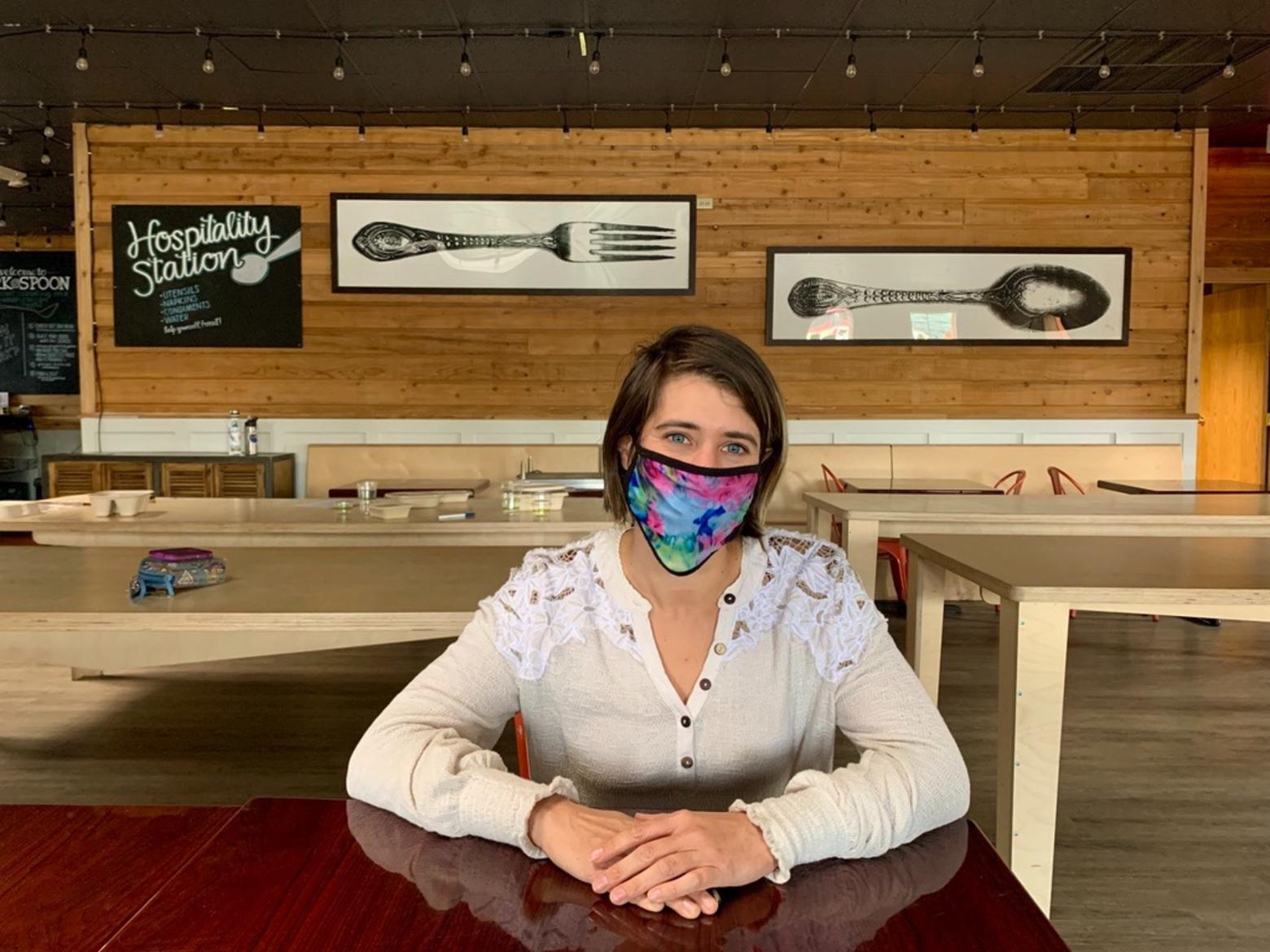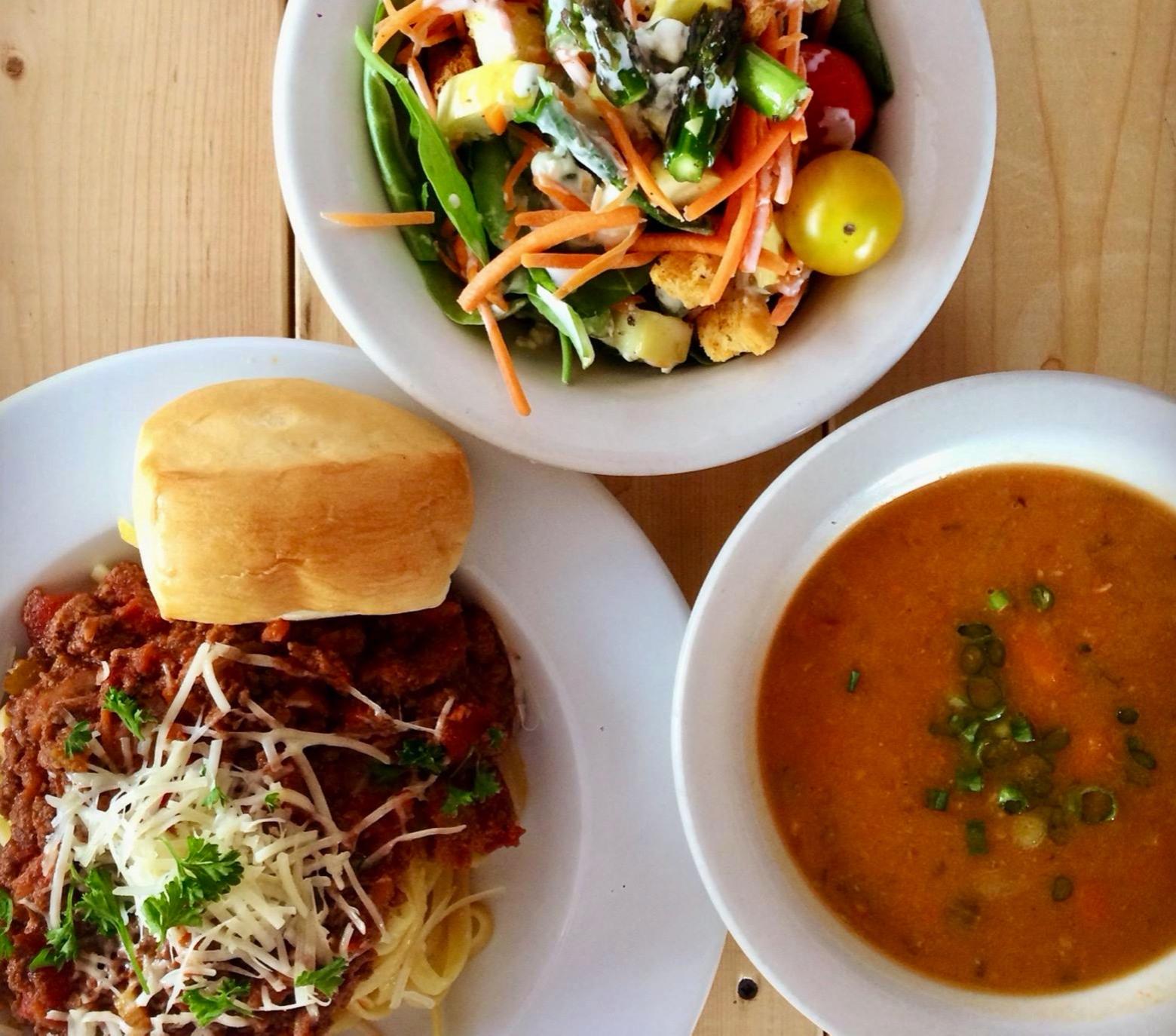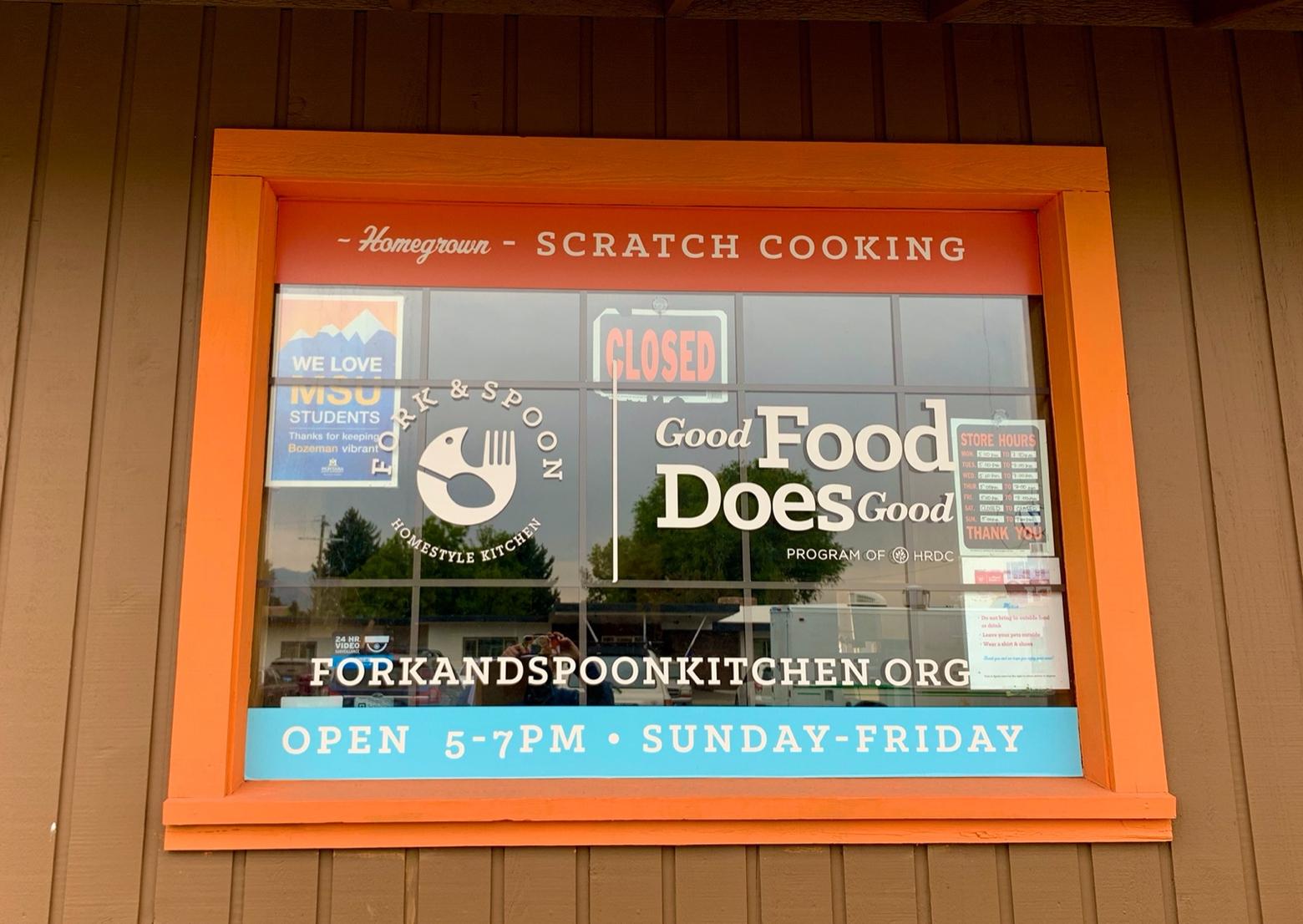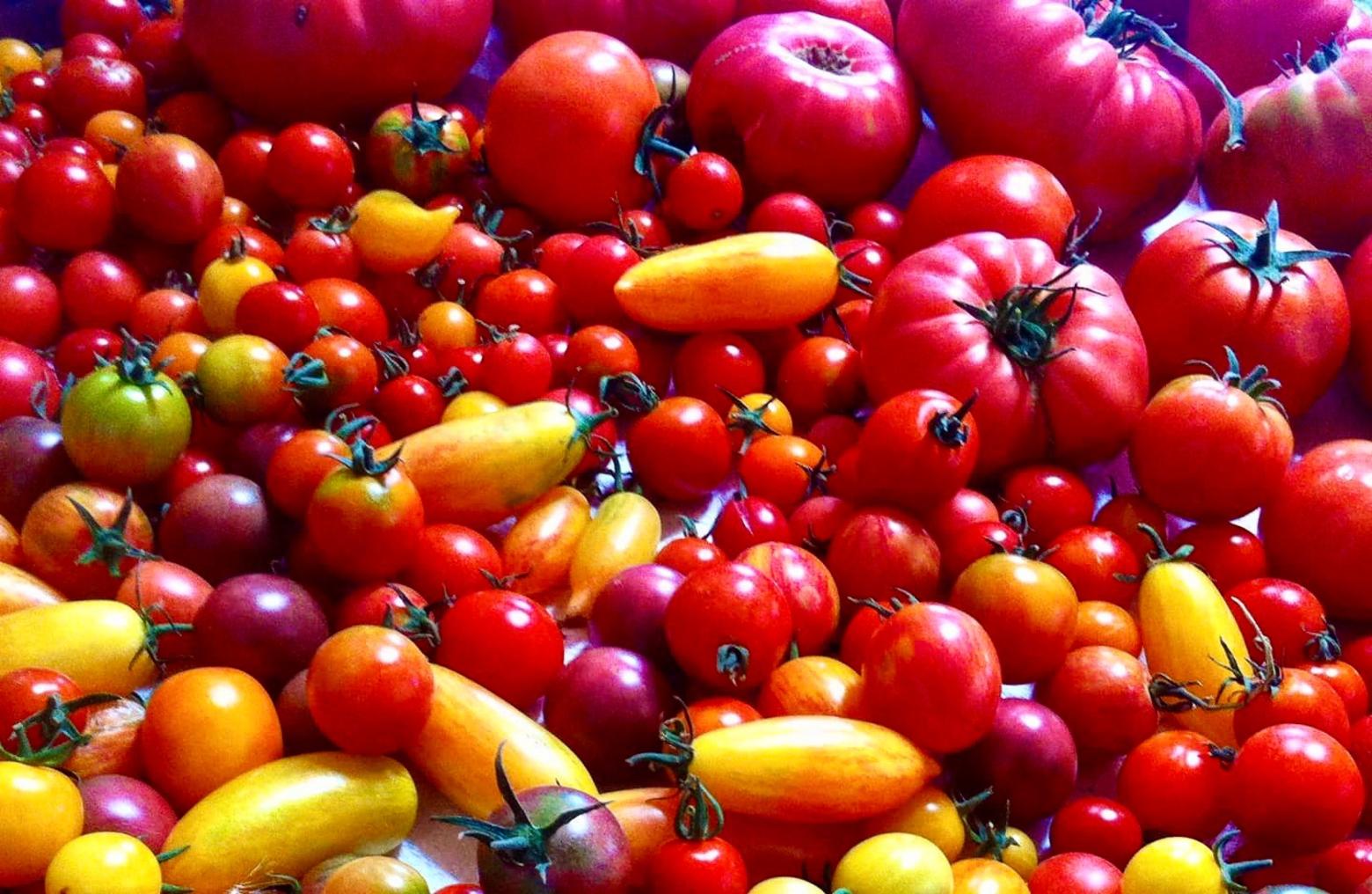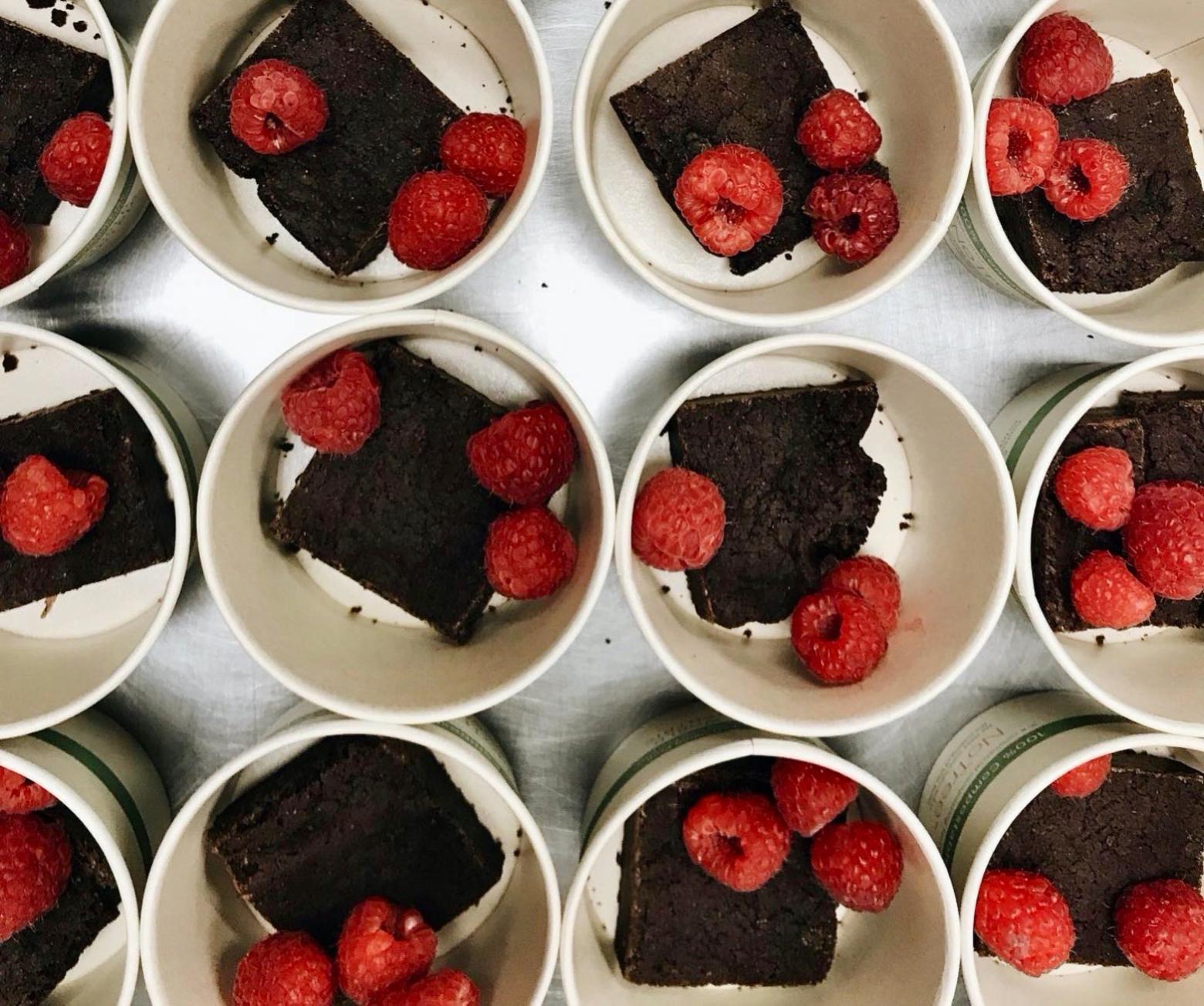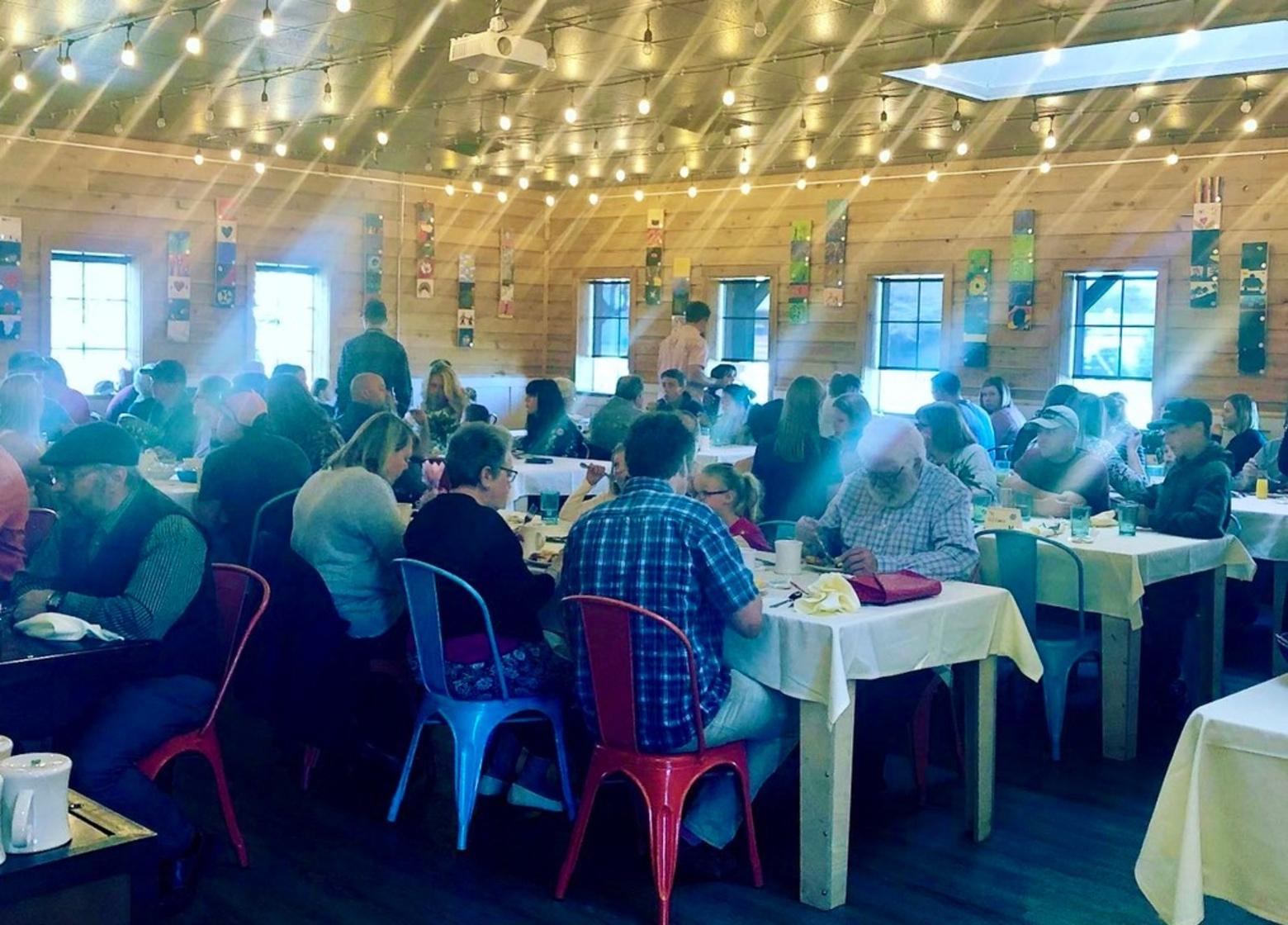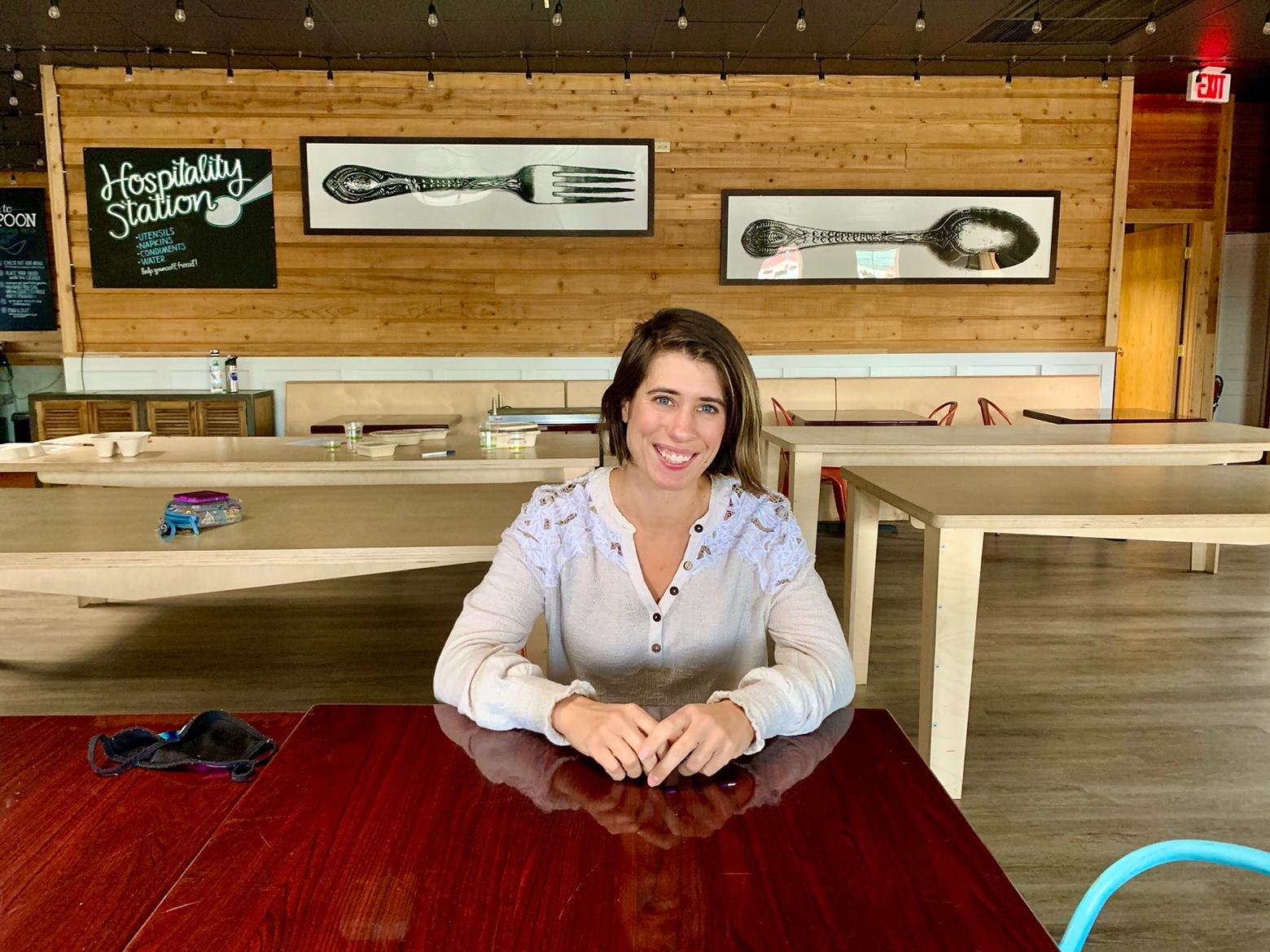Back to Stories Mouthwatering Social Sustenance: How Good Food Holds Communities Together
September 28, 2020
Mouthwatering Social Sustenance: How Good Food Holds Communities TogetherAs covid impacts deepen, supporting Fork & Spoon is a tasty way to fight hunger and enhance human dignity
Chef Leah Smutko has just returned from a drive through rural corners of the Gallatin Valley outside Bozeman. She’s brought back a load of locally-grown produce along with lamb and beef raised on Montana sweetgrass. Tonight on the menu her crew is serving up lasagna in three styles—Bolognese, elk and vegetarian—along with harvest squash, garden salad, herb-flavored tom yum gai soup and blueberry crisp or peach dessert.
Gourmet meals cooked from scratch, freshly made and ready for pickup. These are not mouth-watering dishes prepared for an upscale restaurant but made with care for patrons of the Bozeman eatery Fork & Spoon. The mission of this non-profit, pay-what-you-can place goes beyond simply delivering savory sustenance. It also serves up healthy helpings of dignity to families coping with severe food challenges and it gives peace of mind to the homeless who otherwise might not know where their next meal’s coming from.
As Smutko, who also serves as front of the house manager, said recently, Fork & Spoon, somewhat inconspicuously located along busy North Seventh Avenue, is intended to be a bright spot where diners from all walks of life gather.
But today, right now and for as far into the future as anyone can see, Fork & Spoon desperately needs our help. No matter where you are reading these words, you might also think of Fork & Spoon’s plight as a microcosm of the rising wave of hunger issues reaching into every corner of America.
Fork & Spoon isn’t a fancy schmancy joint; its vibe is like that of a small town Main Street café. Cozy and welcoming, it’s a place where, no matter what’s happening in your life that day, you can look forward to feeling appreciated as a human being, as if invited over to a friend’s kitchen for dinner.
Fork & Spoon was originally named The Community Café and still stands as Montana’s first—and only—social enterprise restaurant, sharing a kindship with similar eateries that have opened in LA, New York City and Seattle. It’s one of several innovative community service offerings hatched by the Human Resources Development Council in Bozeman and which has given the private/public-funded outlet a national reputation.
The fact that food insecurity exists here, in booming Bozeman, Montana, New West symbol of hipness for the outdoor-oriented and upwardly mobile, comes with no small degree of irony.
Fork & Spoon has served up 12,000 meals since March, when the pandemic hit and would have brought in around $28,000 in donations. With its insidious social impacts, Covid-19 forced Fork & Spoon to abruptly shift to take-out only and with that, the contributions of big-hearted people who loved to eat in house—and open their wallets—dried up.
In addition, Fork & Spoon’s small catering operation and money earned from renting out its facility for social events got mothballed too. While demand for meals has only increased, revenue has dropped by more than 80 percent.
“Prior to the global pandemic, we were serving about the same number of people, but we had a variety of patrons, including folks who were paying it forward," says Rick Hilles, Fork & Spoon’s Program Manager. "Now, the vast majority of community members we are serving are in need of a free meal. We simply are not seeing the same number of customers who have the capacity to pay. We are still here to feed our community. Those in need of a meal and those with the ability to pay are welcome to come to Fork & Spoon."
“Pay what you can” means just that within the context of "paying it forward." Diners contribute whatever their budget allows, though the premise is that anyone capable of frequenting a regular restaurant is willing to handle full fair plus tip. Many generously pay more to cover the tab for another.
A donation of $14 covers the cost of a take-out or in-house meal for a Fork & Spoon patron and it helps make this novel farm to kitchen and table social enterprise happen. For those who want to have impact that really ripples, a donation of $500 pays for 90 people to enjoy supper on any given night. Prior to the arrival of covid, many individuals, service organizations religious and businesses were stepping up to the plate (no pun intended).
Young Ms. Smutko is a graduate of the Auguste Escoffier School of Culinary Arts in Boulder, Colorado. She also studied biology at Colorado State University, received a Masters of Sustainable Food Systems at Montana State University and recently has served as a teaching assistant on the Bozeman campus. Known for being tenacious, she wanted to make Fork & Spoon more than a soup kitchen but a beacon of goodwill.
Fork & Spoon operates with a shoestring paid staff and teams of 10 volunteers who show up each day bringing the atmosphere to life. All meals—including kid-friendly entrees— are sourced from local food growers and by being affiliated with the state’s Hunters Against Hunger program, diners are treated to gourmet presentations of deer, elk, antelope, moose and wild bison.
Behind the sanguine shine of Bozeman’s growing national reputation as a livable community is a reality that doesn’t appear in tourism brochures. A lot of people are struggling to make ends meet and having to scrimp when it comes basic necessities—food, clothes, medical care and yes, even shelter, because of skyrocketing real estate values and high rents.
“You might have just read that the median local home price in Bozeman is around $600,000 and that the median family income is $60,000 which seems like a lot, but you can’t own a home on that and there are plenty of people who make far less,” says Darcy Saffer, HRDC’s family support coordinator.
While one of the terms of the era is “food insecurity,” what it means in practical terms is that vulnerable people, especially kids and the elderly, aren’t getting enough to eat. And, with covid driving people into the seclusion of social distancing, it has pushed suffering deeper out of sight and mind. For families across the Gallatin Valley, here’s a startling statistic: three or four of every 10 children are not getting three square meals a day and the most substantial reliable nutrition they receive is breakfast or lunch at school.
"No one should feel stigmatized about being hungry and no one in Bozeman has any less of a right to enjoy a solid, flavorful meal like you would get in a good restaurant. We are committed to making dinner a happy time in peoples’ lives.” —Chef Leah Smutko of Fork & Spoon
When classes weren’t in session this summer, Fork & Spoon functioned as a food preparation hub churning out 500 bag lunches daily that were distributed to kids across the valley. Smutko says that many parents stop by the eatery on their way home from work and pick up dinner. The hope is to restore in-restaurant dining as soon as possible and when it’s safe.
What’s cool about this oasis is that prior to covid, it was a popular spot where people with means liked to go and interact with no pretension, knowing that when they paid full price (and often a few times above full price) they were anonymously buying dinner for another community member. The eatery had special guest chef nights, special presentations on everything from how to paint nature by Mimi Matsuda to performances by local musicians and means inspired by different cultures of the world sponsored by custom travel provider Off the Beaten Path. In other words, there's always something fun going on.
Fork & Spoon has plenty of testimonials from donors who are grateful for the opportunity to do something positive in their town. Smutko shares the story of a grandma, barely getting by on a fixed income, who takes her grandkids in Fork & Spoon as a treat and positive memory-making bonding experience. The grandkids never have to know that the cost of the meals is covered.
Chef Smutko believes that communities worth living in are those that make personal dignity for all a priority. “No one should feel stigmatized about being hungry and no one in Bozeman has any less of a right to enjoy a solid, flavorful meal like you would get in a good restaurant,” she notes while standing over a stack of fresh vegetables about to get sliced and sauteed for the evening meal. “We are committed to making dinner a happy time in peoples’ lives.”
NOTE: Fork & Spoon currently has only take-out, but people are welcome to donate cash at their discretion. The easiest way to contribute by going online and clicking here. Volunteering will re-commence in November.
Want to help others struggling with hunger near you? Here are some groups to contact in communities around Greater Yellowstone that will have ideas for how you can help.
Montana
HRDC Bozeman (it will also have suggestions for how to support communities beyond Bozeman)
Sweet Grass Community Foundation (Big Timber)
Montana Community Foundation (serves communities across Montana)
Wyoming
Wyoming Community Foundation (serves communities across Wyoming)
Idaho
Idaho Community Foundation (serves communities across Idaho)

